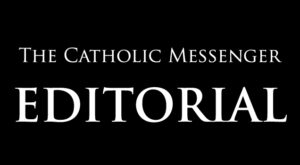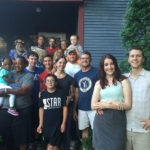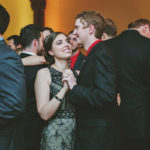 By Barb Arland-Fye
By Barb Arland-Fye
Messenger Editorial
Tim Elskamp, who lives with Down syndrome, radiates love in his role as an altar server at St. Ann Parish in Long Grove, his parents, Dan and step-mother Rhonda Elskamp, say. His ministry began about a year ago, when church roof repairs required celebration of the Mass in the parish chapel. Parishioner Mike Limberg trained Tim, whose favorite responsibility is holding the Roman Missal for the pastor, Father Joe Wolf, as he recites the prayers during Mass.
“He just shines when he’s up there on the altar. He thinks so much of Father,” Dan says. “I was a server a long time ago. It makes me feel good that Tim is doing what I did.” Rhonda says, “People have told me they love seeing Tim up there. He just radiates joy.” Persons with disabilities “just want to be included,” she adds. Father Joe describes Tim as “a delightful man who does a beautiful job assisting at the altar.”
March is Developmental Disability Awareness Month, a good time to learn more about the gifts of persons with developmental disabilities. How might we tap into their potential in service to the Church? The National Catholic Partnership on Disabilities (ncpd.org), shares a message that Pope Francis gave in 2019 at the International Day for Persons with Disabilities. He said, “We are called to recognize in every person with disabilities, even complex and serious disabilities, a unique contribution to the common good through their original life stories. … and to recognize them as persons of equal dignity, as brothers and sisters in humanity.”
A story in this week’s issue (Page 6) focuses on the progress and challenges regarding efforts to include people with disabilities in “the everyday mission for the Church.” The story notes that one in four adults in the U.S. (about 26%), have some type of disability, according to the Centers for Disease Control and Prevention. Nearly 11% experience significant issues with cognition, the CDC reports.
There is room for improvement, beginning with a need to update the U.S. Conference of Catholic Bishops’ (USCCB) 1978 pastoral statement on persons with disabilities. Much has changed in the 45 years since — spanning from education and psychology to medical research and technology. The National Catholic Partnership on Disabilities (NCPD) has submitted a proposal to the USCCB asking for a new pastoral statement on persons with disabilities.
Our diocese has embarked on a synodal journey, with the theme of welcoming and belonging as the first leg. This journey gives us a nudge to consider how we can foster a sense of welcoming and belonging for individuals with disabilities, as members and as ministers in our parishes. Certainly, we need to take into consideration an individual’s talents and skills, just as we would for anyone in ministry. Someone who cannot hold a tune, for example, probably would not be a good fit as a cantor.
The first step in welcoming and belonging is getting to know someone with a disability and to enhance our disability awareness through education and advocacy. Other actions to take:
- Visit the NCPD website (ncpd.org), which offers many resources.
- Read an excellent, succinct summary by the Center for Applied Research in the Apostolate (CARA) on Disabilities in Parishes Across the United States: How Parishes in the United States Accommodate and Serve People with Disabilities (https://tinyurl.com/84xdwetu). Among its fascinating findings: “parishes who have the most accommodations for people with disabilities are also most likely to have at least one person with a disability serving on a parish committee or filling a ministerial role. It seems that active inclusion of those with disabilities in decision-making positions or positions where their perspective can be heard has a high correlation with whether the parish will accommodate parishioners with disabilities.”
- Ask the USCCB to issue a new pastoral statement on persons with disabilities.
- Ask your parish about its receptiveness to persons with disabilities serving in ministerial roles in the liturgy. What training is available? What skills can you share to make it possible for an individual with a disability to minister as an altar server, lector or extraordinary minister of the Eucharist, greeter, usher or choir member?
As Rhonda Elskamp notes, “God made Tim. He made him radiate to the ability that he can.”
Barb Arland-Fye, Editor
arland-fye@davenportdiocese.org











